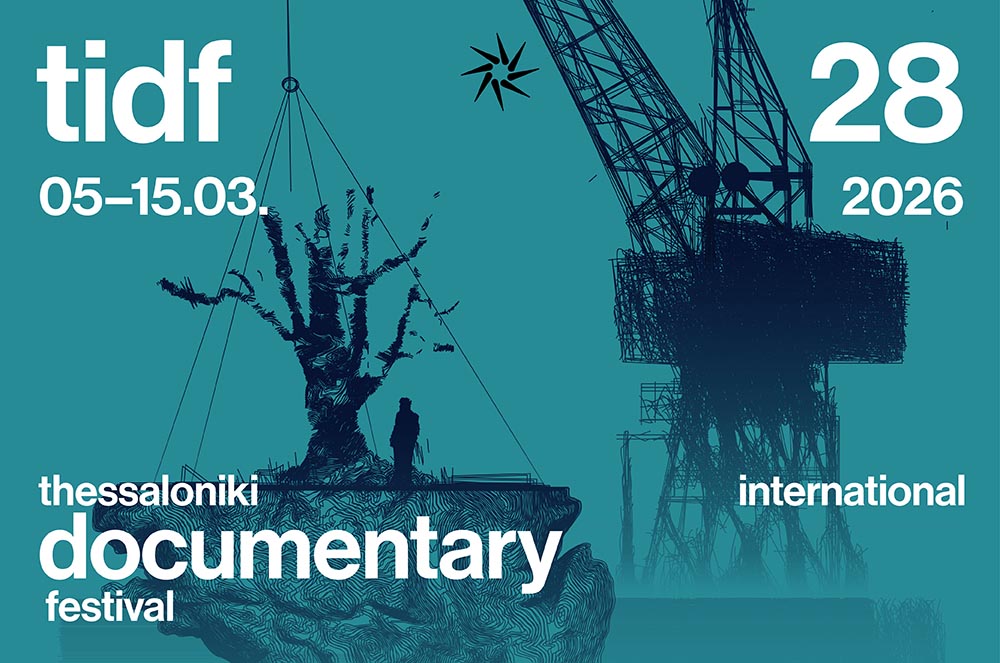The 66th Thessaloniki International Film Festival explores the countless versions of a unique and unparalleled acting talent, welcoming Isabelle Huppert, one of the radiant, daring and multi-awarded stars of world cinema and theater. The Festival, alongside Isabelle Huppert, has selected a total of 15 films that display her outstanding ability for inner transformation for the sake of every role, while maintaining a solid acting identity. The selection of films, directed by beloved filmmakers, spans over different periods and countries.
Isabelle Huppert will spend four days in Thessaloniki, during which she will attend a series of events, screenings and talks. More specifically:
On Tuesday November 4th, she will deliver a large-scale masterclass, open to the public, titled “From Screen to Stage”, delving into the differences and similarities in acting techniques between cinema and theater, moderated by the renowned Greek writer Ersi Sotiropoulou.
In addition, the iconic actress will preface several of the tribute’s films, while also presenting the witty comedy Copacabana (2010) by Marc Fitoussi, along with her daughter and co-star in the film, Lolita Chammah, who is co-starring in the film.
During her presence at the 66th TIFF, she will hold a press conference for all accredited journalists from Greece and abroad.
Moreover, as she expressed a vivid interest in visiting the historical monuments and landmarks of Thessaloniki, the Festival will host a special guided tour, having also undertaken the mission to initiate her into the culinary secrets of a city beating a great gastronomic tradition.
In her frenzy ride in cinema, full of triumphs and praises, Isabelle Hupper has been nominated 16 times for a César Award, holding the indisputable record in the history of the awards. She is a two-time César winner, for her interpretation in the films A Judgement in Stone (1995) by Claude Chabrol and Elle (2016) by Paul Verhoeven, the latter earning her a Golden Globe and a Best Actress Academy Award nomination as well.
In addition, her name figures in the high-profile elite of actors and actresses awarded at the three most prominent film festivals of the world: the Cannes Film Festival for Claude Chabrol’s Violette Nozière (1978) and Michael Haneke’s The Piano Teacher (2001), the Venice Film Festival for Claude Chabrol’s Story of Women (1988) and A Judgement in Stone (1995), and the Berlinale (along with film’s entire female cast) for François Ozon’s 8 Women (2002). The list of honorary distinctions bestowed to Isabelle Huppert is endless, also featuring three European Film Academy Awards, BAFTA, Lumière and David Di Donatello Awards, as well as countless more prizes at dozens of film festivals around the globe. Last but not least, Isabelle Huppert is one of the top-notch names in the worldwide theater stage, having received the Honorary Molière Award and nine nominations, most ever for an actress in the history of the awards.
Isabelle Huppert has consistently refused to contain herself within safety spaces and labels, ever since her early steps in cinema. Truly tireless, with more than 120 (!) films under her belt, she has embarked on a thundering international journey, while remaining an undisputed icon of French cinema. She has teamed up with legendary film directors from all around the world, among whom stand out the names of Michael Haneke, Claude Chabrol, Bertrand Tavernier, Benoît Jacquot, Jean-Luc Godard, Claire Denis, André Téchiné, Claude Sautet, François Ozon, Olivier Assayas, the Taviani brothers, Andrzej Wajda, Marco Bellocchio, Paul Verhoeven, Marco Ferreri, David O. Russell, Hal Hartley, Hong Sang-soo. Versatile and pluralistic in her professional life, Huppert has proven time and time again that her stardom goes way beyond any geographical, cultural or linguistic restraints.
Gifted with the rare charisma of portraying an immense gamut of feelings, dispositions and situations in the most genuine and unpretentious manner, Isabelle Huppert has the power to immerse the viewer into uncharted territories and obliterate any given sense of certainty or security. Throughout her entire career, she has excelled in an impressive variety of film genres, ranging from thrillers, dramas and comedies all the way to romances and satire films. Fearless in her selection of roles, she has breathed life into a series of unforgettable female characters who break free from the boundaries of moralism and predictability, forging a legacy of (already) immeasurable value.
Let’s take a glance at the films of the 66th TIFF’s tribute to Isabelle Huppert:
Thierry Klifa’s latest political drama The Richest Woman in the World (2025, Greek premiere) which premiered Out of Competition at the 2025 Cannes Film Festival, is based on the the notorious Bettencourt affair, one of France’s most sensational political scandals. Isabelle Huppert delivers a commanding performance as Marianne Farrère, a wealthy heiress whose extravagant gifts to a much younger artist ignite public outrage. What begins as a seemingly private matter quickly escalates into a national scandal, exposing allegations of manipulation, corruption, and the involvement of former political leaders. Anchored by Huppert’s magnetic presence, by turns glamorous, enigmatic, and defiant, the film explores the vulnerabilities of immense wealth and the corrosive overlap of money, art, and politics. Klifa’s elegant direction transforms a true-event inspiration into a sharp, engrossing character study.
* Presentation of the film by Isabelle Huppert
In Élise Girard’s Sidonie in Japan (2023), a well-known French author reluctantly travels to Japan to reissue her first book, which had catapulted her to fame in the '70s. There, besides battling persistent jet lag, she is greeted by the ghost of her late husband, who makes regular appearances and she finds herself in a seemingly futile flirtation with the local publisher. With her trademark grace, the remarkable Isabelle Huppert embodies a heroine determined not to be indefinitely lost in translation or in her own past. With the French star and Tsuyoshi Ihara flawlessly leading the cast, Sidonie in Japan manages to be funny, melancholically realistic, and at the same time unapologetically romantic, as it fearlessly confronts the ghosts of yesterday to highlight, in perfect harmony with the unadulterated beauty of the Japanese landscape, the importance of renewal.
Ira Sach’s Frankie (2019) is an excellent, profoundly human drama set against the backdrop of the sunlit Sintra, Portugal. Francoise Crémont, or Frankie, is a renowned French actress who knows that she has but a few months left to live, so she brings her extended family together for one last vacation. Isabelle Huppert embodies the main heroine with a quiet strength and disarming sensitivity, a woman with a dynamic personality painfully coming to terms with the fact that her time is running out. However, life goes on around her: marriages fall apart, new romances appear, friendships are tested, and long-buried truths begin to surface. Ira Sachs draws inspiration from Éric Rohmer’s aesthetic, deliberately maintaining a slow pace, with realistic performances, and sets that emotionally accompany the film’s characters. With his signature tenderness, the filmmaker captures twenty-four hours, focusing on the small, inconsequential, day-to-day moments, where everything and nothing occurs simultaneously.
In Elle (2016), a razor-sharp psychological drama set as a daring exploration of power, desire, and survival by the always daring Paul Verhoeven, Isabelle Huppert plays Michèle Leblanc, the formidable head of a Parisian video game company, played with extraordinary nuance by Isabelle Huppert. After being violently raped in her home by a masked intruder, Michèle refuses to be victimized. Instead, she begins a tense and unsettling cat-and-mouse pursuit of her assailant, blurring boundaries between revenge, obsession, and control. Verhoeven brings his signature blend of audacity, dark humor, and unflinching provocation, crafting a film that is part thriller, part satire, part character study. The film won the Golden Globe Award for Best Foreign Language Film and was nominated for eleven César Awards, winning Best Film and Best Actress for Huppert, whose performance, hailed as one of her finest, also earned her the Golden Globe Award for Best Actress in a Drama and an Academy Award nomination.
Valley of Love (2015) by Gillaume Nicloux is a riveting film about mourning, serving as an elegy on memory and reconciliation. Isabelle Huppert and Gérard Depardieu star in this metaphysical road movie, portraying two estranged parents who reconnect in the scorched landscapes of the Death Valley, California, after the enigmatic letter their son Michael sent, six months before committing suicide. Swept into a peculiar journey of initiation that Michael has designed for them, they are forced to confront not only the aftermath of their loss, but also the lingering shadows of their own wrecked relationship. Delivering one of her most touching performances, Hupper embodies, with raw sensitivity and fierce determination, the role of the mother who attempts to face the unimaginable. The harsh, otherworldly beauty of the Death Valley is captured in breathtaking imagery, which secured the film the César for Best Cinematography (2016).
Louder Than Bombs (2015), Joachim Trier’s first English-language feature, is a finely wrought family drama about memory, grief, and the stories we tell about those we lose. Three years after the sudden death of renowned war photographer Isabelle Reed (Isabelle Huppert), a retrospective exhibition brings her eldest son Jonah (Jesse Eisenberg) back home. There he reunites with his father Gene (Gabriel Byrne) and younger brother Conrad (Devin Druid), whose silence masks deeper turmoil. Under one roof again, the family struggles to bridge the distances between them, each haunted by conflicting memories of the woman who shaped their lives. Premiering in Competition at the 2015 Cannes Film Festival, Louder Than Bombs showcases Trier’s gift for emotional precision and layered storytelling, featuring exquisite performances that anchor its exploration of love, absence, and the fragile bonds between fathers, sons, and the departed.
In the witty comedy Copacabana (2010) by Marc Fitoussi, Isabelle Huppert plays Babou, an independent woman who lives on her own terms, disregarding jobs, responsibility, or convention. But when she discovers that her daughter Esméralda (played by Huppert’s real-life daughter, Lolita Chammah) is too ashamed to invite her to her wedding, Babou decides to prove she can change. Taking a job as a timeshares salesperson on Belgium’s gray seaside, she unexpectedly excels as a model employee, until her irrepressible nature inevitably disrupts her newfound stability. Huppert’s award-winning performance imbues Babou with irresistible magnetism, embodying the heroine’s folly, as well as her untamed spirit. At the same time, the fast-paced editing mirrors Babou’s restless rhythm, in a comedy that is rooted in the contrast between her imaginary longing for exotic places and the deliberately melancholic landscapes, in which Copacabana is set.
*Presentation of the film by Isabelle Huppert and Lolita Chammah.
In White Material (2009), a haunting drama by Claire Denis, Isabelle Huppert portrays Maria Vial (Isabelle Huppert), a French coffee grower who stubbornly stays on her plantation in a Francophone African country as civil war erupts. Huppert delivers one of her most ferocious and complex performances, portraying a woman torn between determination and delusion. Denis, known for her visceral style and capacity to fuse beauty with brutality, frames this story with dreamlike imagery, moral ambiguity, and the collapse of colonial certainties. The film premiered in Competition at the Venice Film Festival (2009). It has since been praised in critics’ top lists and voted among the greatest films of the 21st century. White Material remains a powerful exemplar of post-colonial tension, human endurance, and cinematic vision.
François Ozon’s playful yet irresistibly elegant musical mystery film 8 Women (2002) is a Technicolor feast of intrigue and femme fatale brilliance, based on the famous play by the French writer Robert Thomas. Trapped in a luxurious 1950s mansion due to a blizzard, eight women – portrayed by some of the greatest stars of French cinema – attempt to solve the murder of the only man in the household. Each of them has a motive. One of them is the killer. Isabelle Huppert as the panic-stricken, melodramatic Aunt Augustine is quite a revelation. With dramatic intensity, caustic humor, and incredible comedic timing, Huppert delivers an eerily tender performance, topped with what is now considered a classic scene where she plays “Message Personnel” on the piano. With a close-up shot, Ozon focuses on her face, capturing her charged emotional state as she utters “I love you… maybe.” Rounding out the illustrious cast are Catherine Deneuve, Fanny Ardant, Emmanuelle Béart, and Danielle Darrieux. The film won the Silver Bear for Outstanding Artistic Contribution at the Berlin International Film Festival and garnered multiple nominations at the European Film Awards, making 8 Femmes an irresistible cinematic experience. .
The Piano Teacher (2001), Michael Haneke’s searing 2001 drama, is a chilling portrait of depression, desire, and power. In her late thirties, Erika Kahut is a piano teacher at the esteemed Vienna Conservatory. She is strict, intimidating and respected; however, her personality is a diligent construction and a painful response to her constricted life. She still shares an apartment with her mother, and their co-dependent relationship is stifling and even violent. Nowhere in Erika’s world is there anything approaching happiness. At the same time that she is forbidding and cold, Erika is a cultural ideal. Even though she repeatedly professes to have no emotions, her repressed feelings drive her to morbid voyeurism and horrendous acts of self-mutilation. And then Walter, a younger student, decides to seduce his teacher, believing that he senses a kindred spirit... Premiering in Competition at the Cannes Film Festival, the film won the Grand Prix, with Huppert and Magimel jointly receiving the Best Actress and Best Actor awards.
A Judgement in Stone (1995) by Claude Chabrol, one of the most fascinating films of the 90s, is inspired by the true story of the Papin sisters, two housekeepers who murdered their employers in provincial France during the '30s. Jean Genet’s 1947 play The Maids, and Ruth Rendell’s 1977 novel A Judgement in Stone provided first-class material for Claude Chabrol to make an odd yet riveting film that became a landmark of '90s French cinema. At the same time, the film gave Isabelle Huppert the unique opportunity to flesh out yet another wholly idiosyncratic character, earning her both the César Award for Best Actress, and the respective award at the Venice Film Festival, which she shared with her exceptional co-star Sandrine Bonnaire. A top-notch cinematic depiction of the social disparities and inhibitions of French society, A Judgement in Stone leads to a shockingly mounting crescendo of violence and immorality. The film was a primary source of inspiration, among others, for the triumph of 21st-century Korean cinema, Bong Joon-ho's Parasite.
Noir intrigue and philosophical comedy intertwine unexpectedly in Hal Hartley’s Amateur (1994), a landmark in the rebirth of the 1990s American indie cinema. In this breathtaking tour-de-force performance, Isabelle Huppert portrays an ex-nun turned writer of erotic literature (her namesake), who believes that the Virgin Mary has instructed her to intervene in the destiny of a troubled porn star. Her path crosses that of Thomas, a handsome amnesiac she encounters in the street, sweeping them both into a bizarre chain of ethical dilemmas, desire, and absurd violence. Amateur, which had its premiere at the Cannes Director's Fortnight, showcases Hartley’s signature balancing act between irony and compassion, delivering one of Isabelle Huppert’s most moving performances in English. A hilarious yet simultaneously melancholically pensive approach to sin, salvation, and reinvention, drawing from Godard’s cinematic universe.
Claude Chabrol’s stark Story of Women (1988) unfolds the story of Marie Latour, a poor mother of two in Nazi-occupied France who clandestinely performs abortions to support her family. Renting rooms to sex workers and defiantly taking a lover, Marie’s independence enrages her embittered husband, who betrays her to the authorities. Arrested under the Vichy regime, she is tried for “crimes against the state” and made an example of, condemned to the guillotine in 1943. Premiering in Competition at the Venice Film Festival, the film won the Silver Lion and earned Isabelle Huppert the Volpi Cup for Best Actress. Chabrol’s austere, incisive direction and Huppert’s fearless, nuanced performance transform Marie’s tragic story into both a devastating character study and an unflinching critique of hypocrisy, morality, and state power. A searing highlight of Chabrol’s late career, it remains one of French cinema’s most powerful indictments of injustice.
In Joseph Losey’s The Trout (1982), Frédérique, nicknamed "The trout", played by Isabelle Huppert, is very much like the fish she used to own when she lived with her father in their Jura hometown. Cold and elusive, she comes on to men and then rejects them. One night, while she is at a bowling alley with her husband, she meets two businessmen. They are immediately taken with Frédérique's saucy innocence. One of the men invites her to accompany him on a business trip to Japan. Frédérique agrees out of provocation, but the trip turns out to be an overture to tragedy. Directed by Joseph Losey, The Trout bears his incisive vision of power, desire, and alienation. With Isabelle Huppert’s precise performance at its core, Losey crafts a stylish, unsettling portrait of manipulation and the hidden dangers beneath charm and seduction.
Heaven’s Gate (1980), the film directed by Michael Cimino right after the Oscar triumph of The Deer Hunter (1978), as well as the English-speaking debut of Isabelle Huppert, is a grandiose western film of epic proportions, with a tumultuous story in the background. The film was butchered by critics and the audience, ended up in a box-office bomb, was re-released in a shorter version, and led United Artists to bankruptcy. Many years had to pass before the film was drastically reevaluated, and eventually hailed as a daring and monumental work of American cinema. Set against the backdrop of the Johnson County War in 1892, when a ruthless cattle owners' association attempts to drive away the poor European immigrants from Wyoming, Cimino weaves an operatic story of love, violence and revenge, illuminated by Vilmos Zsigmond’s rapturous cinematography, which transforms vast vistas into symbols of both the brutality and the promise of an American frontier.















